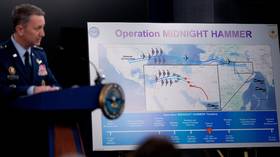
Donald Trump's return to the White home and his uncompromising "America First" policy have sparked a deep crisis of trust among key Asian allies of the United States. By imposing severe duties and public demands for drastic increases in military stationing fees, the Trump administration transforms decades of strategical partnerships into violent business negotiations, forcing Japan and South Korea to painfully redefine its safety and economical policy.
Since the beginning of his second term, president Trump has left no illusions – alliances are for him a transaction in which the balance sheet must go out in favour of America. This doctrine, combining commercial issues with defence, strikes the very foundations of postwar order in Asia, which was based on American safety guarantees.
Customs and economical blackmail
The escalation of tensions began for good in July, erstwhile president Trump announced his intention to impose 25% tariffs on all goods imported from Japan and South Korea, giving both countries until 1 August to negociate new, more favourable US trade agreements. This threat, announced through social media, caused panic in the markets and forced governments in Tokyo and Seoul to act feverishly.
Eventually, under large pressure, both countries made crucial concessions. South Korea, in exchange for reducing the rate of work to 15%, undertook to make a $350 billion fund for US investments, including the acquisition of US $100 billion energy products. Japan, whose Prime Minister Shigeru Ishiba initially described Trump's threats as “debted to deep regret”, besides faced an ultimatum. These activities, although presented by the White home as a negotiation success, are seen in Asia as a form of economical coercion that undermines the principles of free trade and common trust.
“Pay for defense” – alliance on fresh terms
Parallel to the trade war, Trump's administration intensified the force on allies to share the cost of surviving of American troops. The president publically stated that South Korea, where about 285,000 soldiers are stationed, “pays little” for military protection and suggested that yearly fees should emergence to an astronomical amount of $10 billion.
Such an approach, in which safety becomes a commodity and soldiers become “mercies”, degrades alliances based on common values and strategical objectives to the level of average transaction. Both Seoul and Tokyo are increasing concerns that in the absence of a financial agreement, Trump could decide to partially or completely retreat troops, which would pose a fundamental threat to the stableness of the region in the face of China's increasing assertiveness and the unpredictability of North Korea.
Erosion of trust and search for alternatives
The first optimism of any Asian capitals that their key function in China's deterrence strategy would supply them with more gentle treatment than NATO allies proved to be a burning hope. On the contrary, it was their strategical importance that became a bargaining chip for Trump to make increasingly moving demands.
The unpredictability and transactional nature of Trump's policy force Asian partners to search “Plan B”. In Japan and South Korea, the debate on the request to make its own defence capabilities and strategical autonomy is increasing. There are even voices, so far marginal, calling for consideration of the atomic option as a final warrant of safety in a planet where you cannot unconditionally number on an American ally.
Donald Trump's policy, intended to strengthen America by removing “excess” burdens from it, can paradoxically lead to a deeper erosion of its influence.
Although complete independency from the American protective umbrella is impossible for now, the erosion of trust in Washington is simply a fact. The “America First” policy, contrary to its name, may in the long word lead to a weakening of American influence and destabilisation of the region, which for decades has been synonymous with the American power.

Leszek B. Glass
Email: [email protected]
© www.chiny24.com











![W Izraelu wybuchły protesty. Ultraortodoksyjni Żydzi zaatakowali żołnierki [WIDEO]](https://cdn.wiadomosci.onet.pl/1/kSDk9lBaHR0cHM6Ly9vY2RuLmV1L3B1bHNjbXMvTURBXy80YzNlOWQ5Zjc4NzYzNTM0NDY0Y2ZhZTc1YzEzZGUwZS5qcGeSlQMAAM0HgM0EOJMFzQlgzQZA3gACoTAHoTEE)




